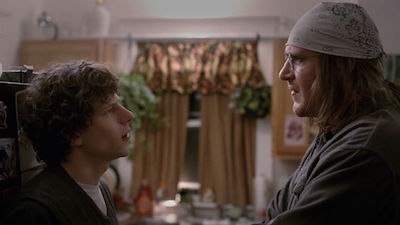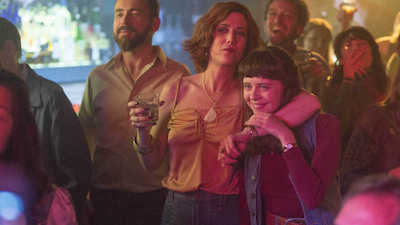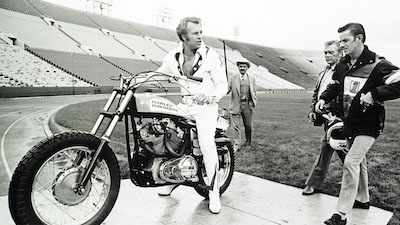 Hard as it is for would-be blockbusters like Tomorrowland, Terminator: Genisys, The Fantastic Four, and The Man from U.N.C.L.E to find favor with ticket buyers, it’s harder still–impossible, almost–for independent films to drum up much support in a marketplace where they’re scatttered among different “platforms,” in search of niche audiences that may not know where to find them, or know what they’re about if they blunder into them. The biggest “hit” in that sector, if one can call it that, is a spring release from The Weinstein Company, Woman in Gold, which has grossed about $33 million. Little else has come close to reaching even that modest sum, with a summer bright spot, Mr. Holmes, at about half that.
Hard as it is for would-be blockbusters like Tomorrowland, Terminator: Genisys, The Fantastic Four, and The Man from U.N.C.L.E to find favor with ticket buyers, it’s harder still–impossible, almost–for independent films to drum up much support in a marketplace where they’re scatttered among different “platforms,” in search of niche audiences that may not know where to find them, or know what they’re about if they blunder into them. The biggest “hit” in that sector, if one can call it that, is a spring release from The Weinstein Company, Woman in Gold, which has grossed about $33 million. Little else has come close to reaching even that modest sum, with a summer bright spot, Mr. Holmes, at about half that.
It’s a depressing scenario, until one considers the plight of foreign-language releases, which are doing merde business. Not that they make it easy on themselves: the German history riff on Vertigo, and every plastic surgery potboiler you’ve ever seen, Phoenix, doesn’t really rise from the ashes of old movies until its last scene, and while admiring star Nina Hoss I’m conflicted about the repeat pilfering of her frequent director, Christian Petzold. Still, at least it has a distributor that’s pushing it: TWC, flacking Helen Mirren and Southpaw, films that don’t exactly crease the envelope of imaginative cinema, punished Amelie director Jean-Pierre Jeunet’s The Young and Prodigious T.S. Spivet with a throwaway release following scuffles over director’s cut, and is only now escaping Shanghai, with John Cusack and Chow Yun-Fat, into a handful of theaters. Completed in 2008, that one was released in 2010 in the rest of the world, just as co-star Hugh Bonneville was beginning his reign over Downton Abbey. Thanks to home video I’ve seen both of these shelf-sitters, and, they’re decent, with Spivet offering world-class 3D if you can find it somewhere other than its 1D US theatrical release. Brutal.
But if you’re one of those old duffers who still likes to see movies at the bijou (that means “theater,” kids), I’ve got some to recommend.
 In typical indie movie fashion, The End of the Tour got some buzz around its big city release last month (“Will Jason Segel get an Oscar nomination? “How ‘real’ is his David Foster Wallace?,” that sort of coverage) and now that it’s expanding, crickets. Not unsurprisingly–the movie is narrowcast to admirers of the late author, as he lurches toward, and shrinks away from, mainstream success, while journalist Jesse Eisenberg tries to figure out a way to ask him tough questions about rumored heroin abuse. If you’re waiting for Richard Linklater’s new movie, wait no longer–he had nothing to do with it, but it’s loose and chatty, like one of his films, and the talk, expertly delivered by the two actors, is stimulating, and sobering. (Wallace forecasts dismaying technological develoopments for a near future he would not live to see.) Not knowing all that much about Wallace to begin with, I have no dog in the hunt regarding the film’s accuracy, and I can say it worked in the moment for me.
In typical indie movie fashion, The End of the Tour got some buzz around its big city release last month (“Will Jason Segel get an Oscar nomination? “How ‘real’ is his David Foster Wallace?,” that sort of coverage) and now that it’s expanding, crickets. Not unsurprisingly–the movie is narrowcast to admirers of the late author, as he lurches toward, and shrinks away from, mainstream success, while journalist Jesse Eisenberg tries to figure out a way to ask him tough questions about rumored heroin abuse. If you’re waiting for Richard Linklater’s new movie, wait no longer–he had nothing to do with it, but it’s loose and chatty, like one of his films, and the talk, expertly delivered by the two actors, is stimulating, and sobering. (Wallace forecasts dismaying technological develoopments for a near future he would not live to see.) Not knowing all that much about Wallace to begin with, I have no dog in the hunt regarding the film’s accuracy, and I can say it worked in the moment for me.
Plotted around a book tour, The End of the Tour is a road movie. So is Grandma, which doesn’t get very far, just a few neighborhoods in L.A., as grandma (Lily Tomlin), fresh from giving her younger girlfriend (Judy Greer) the boot one morning, takes to the streets to hustle a few dollars for her granddaughter’s abortion that afternoon. At 75, Tomlin is in amazing shape (how fortunate she was not to have to age out of conventional looks) but she takes us deep into the lacerated heart of her character, who uses a steady stream of zingers as a defense mechanism but is clearly tired of keeping her guard up. Written, produced, and directed by Paul Weitz (About a Boy), Grandma is arranged around brief encounters, with an overbearing daughter (Marcia Gay Harden), a boyfriend from a prior sexuality (Sam Ellliott), and assorted obstacles and functionaries, including Elizabeth Pena in one of her last roles. (Judy Geeson turns up, too, as Greer’s mother). Its center, however, is the byplay between Tomlin and Julia Garner, as they discuss the impending procedure with indie film candor. Not a tract–what you think will be the movie’s big confrontation is cut short, humorously–a movie that’s willing to discuss pertinent issues is one I’m willing to meet at least halfway, and at 82 minutes Grandma doesn’t overstay her welcome. (I love her car, Tomlin’s own, as it happens. No perks in Indieland.)
 Speaking of candor–The Diary of a Teenage Girl, can we talk? The most bracing couple of hours I’ve spent at the movies this year, it begins with our 15-year-old diarist, Minnie (Bel Powley), duly reporting her first sexual experience (“holy shit!”)–then explores the ramifications of the act, with her mother’s footloose boyfriend (Alexander Skarsgard), in amazingly frank, funny, squirm-inducing, and non-judgmental fashion. It’s the mid-70s, in San Francisco, a different era, with the same underlying confusions and anxieties, sometimes illustrated via animation (the movie is based on a graphic novel). When grounded in everyday, hardscrabble life, the film is at its best, however–when Minnie and a friend try prostitution on a barroom lark, or when she and mom (Kristen Wiig) snort cocaine together, you wonder where the tipping point will be. There is one, but there’s little here that’s pat or predictable–you leave the theater with your head cleared, discomfited (Powley, a 23-year-old Brit, looks 15) yet exhilarated. Director Marielle Heller has gotten such honest, daring performances from the cast (is there anywhere Wiig can’t, or won’t, go?) and has told the story so expressively I’m awed. If you think Trainwreck is daring, prepare to have your fuses blown–The Diary of a Teenage Girl is messy, lyrical, emotionally and pictorially naked, and gorgeous. Hardcore indie.
Speaking of candor–The Diary of a Teenage Girl, can we talk? The most bracing couple of hours I’ve spent at the movies this year, it begins with our 15-year-old diarist, Minnie (Bel Powley), duly reporting her first sexual experience (“holy shit!”)–then explores the ramifications of the act, with her mother’s footloose boyfriend (Alexander Skarsgard), in amazingly frank, funny, squirm-inducing, and non-judgmental fashion. It’s the mid-70s, in San Francisco, a different era, with the same underlying confusions and anxieties, sometimes illustrated via animation (the movie is based on a graphic novel). When grounded in everyday, hardscrabble life, the film is at its best, however–when Minnie and a friend try prostitution on a barroom lark, or when she and mom (Kristen Wiig) snort cocaine together, you wonder where the tipping point will be. There is one, but there’s little here that’s pat or predictable–you leave the theater with your head cleared, discomfited (Powley, a 23-year-old Brit, looks 15) yet exhilarated. Director Marielle Heller has gotten such honest, daring performances from the cast (is there anywhere Wiig can’t, or won’t, go?) and has told the story so expressively I’m awed. If you think Trainwreck is daring, prepare to have your fuses blown–The Diary of a Teenage Girl is messy, lyrical, emotionally and pictorially naked, and gorgeous. Hardcore indie.
Queen of Earth is more poseur indie, with a distraught Elisabeth Moss hoping to heal at the lake house of a friend (Katherine Waterston, from Inherent Vice), then getting a heap of misery as the gloves come off and their shaky relationship is dissected in horror-ish fashion. Passing the Bechdel Test from Hell, with the two leads ripping into each other with all the gusto of a millennial Hush…Hush, Sweet Charlotte, the film is agonized but insubstantial, an intermittently gripping exercise. (And stolen, sorry, ladies, by the sneakily insinuating Patrick Fugit, who 15 years after Almost Famous is ready for leading roles.) The strangest thing about this one is that writer-director Alex Ross Perry, with this and the equally provocative/maddening Listen Up Philip under his belt, is prepping a Winnie the Pooh movie for Disney.
 Documentaries have also had a rough time this year, with Amy one of the few to succeed. (Best of Enemies, about the William F. Buckley and Gore Vidal TV debates during the 1968 political conventions, is reasonably engrossing if a bit limited.) The sensational Being Evel rocket-fuels the summer with an affectionate, yet very candid, look back at the daredevil, back when that term really meant something. Today anyone can climb a mountain and put it on YouTube, but back in the day you had to hustle for attention and earn it, and how Evel Knievel earned it! Who didn’t watch all his crazy stunts on TV? (Say “Snake River” to someone my age and see what they say back…that’s right, “Evel Knievel.”) I don’t think I missed one–not knowing the emotional wreckage going on backstage, and the actual physical toll exacted by all those broken bones and concussions with each motorcycle jump, which had to be crazier than the last. What a character, the subject of two movies in his heyday, and maybe more today now that he’s passed into legend. But it’s Daniel Junge’s outstanding documentary, with commentary by Jackass‘ Johnny Knoxville and the late Frank Gifford, that captures the man in full. The ulimate badass is here to save summer moviegoing.
Documentaries have also had a rough time this year, with Amy one of the few to succeed. (Best of Enemies, about the William F. Buckley and Gore Vidal TV debates during the 1968 political conventions, is reasonably engrossing if a bit limited.) The sensational Being Evel rocket-fuels the summer with an affectionate, yet very candid, look back at the daredevil, back when that term really meant something. Today anyone can climb a mountain and put it on YouTube, but back in the day you had to hustle for attention and earn it, and how Evel Knievel earned it! Who didn’t watch all his crazy stunts on TV? (Say “Snake River” to someone my age and see what they say back…that’s right, “Evel Knievel.”) I don’t think I missed one–not knowing the emotional wreckage going on backstage, and the actual physical toll exacted by all those broken bones and concussions with each motorcycle jump, which had to be crazier than the last. What a character, the subject of two movies in his heyday, and maybe more today now that he’s passed into legend. But it’s Daniel Junge’s outstanding documentary, with commentary by Jackass‘ Johnny Knoxville and the late Frank Gifford, that captures the man in full. The ulimate badass is here to save summer moviegoing.





Comments